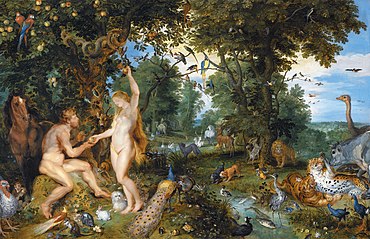
Back Erfsonde Afrikaans الخطيئة الأصلية Arabic الخطيئه الاصليه ARZ Pecáu orixinal AST İlk günah Azerbaijani Першародны грэх Byelorussian Първороден грях Bulgarian Pec'hed orin Breton Pecat original Catalan Prvotní hřích Czech
This article has an unclear citation style. (September 2024) |

Original sin (Latin: peccatum originale) in Christian theology refers to the condition of sinfulness that all humans share, which is inherited from Adam and Eve due to the Fall, involving the loss of original righteousness and the distortion of the Image of God.[1] The biblical basis for the belief is generally found in Genesis 3 (the story of the expulsion of Adam and Eve from the Garden of Eden), and in texts such as Psalm 51:5 ("I was brought forth in iniquity, and in sin did my mother conceive me") and Romans 5:12–21 ("Therefore, just as sin entered the world through one man, and death through sin, and in this way death came to all people, because all sinned").[2]
The specific doctrine of original sin was developed in the 3rd century struggle against Gnosticism by Irenaeus of Lyons, and was shaped significantly by Augustine of Hippo (354–430 AD), who was the first author to use the phrase "original sin".[3][4] Influenced by Augustine, the Councils of Carthage (411–418 AD) and Orange (529 AD) brought theological speculation about original sin into the official lexicon of the Church.[5]
Protestant Reformers such as Martin Luther and John Calvin equated original sin with concupiscence (or 'hurtful desire'), affirming that it persisted even after baptism and completely destroyed freedom to do good, proposing that original sin involved a loss of free will except to sin.[6] The Jansenist movement, which the Roman Catholic Church declared heretical, also maintained that original sin destroyed freedom of will.[7] Instead, the Catechism of the Catholic Church declares that "Baptism, by imparting the life of Christ's grace, erases original sin and turns a man back towards God, but the consequences for nature, weakened and inclined to evil, persist in man and summon him to spiritual battle",[8] and the Council of Trent states that "whereas all men had lost their innocence in the prevarication of Adam [...] although free will, attenuated as it was in its powers, and bent down, was by no means extinguished in them."[9]
- ^ McKim 1996, p. 197.
- ^ Vawter 1983, p. 420.
- ^ Patte 2019, p. 892.
- ^ Cross 1966, p. 994.
- ^ Wiley 2002, p. 56.
- ^ Wilson 2018, pp. 157–187.
- ^ Forget 1910.
- ^ Catechism of the Catholic Church 2003, para. 405.
- ^ Council of Trent, Session VI, Chapter I.